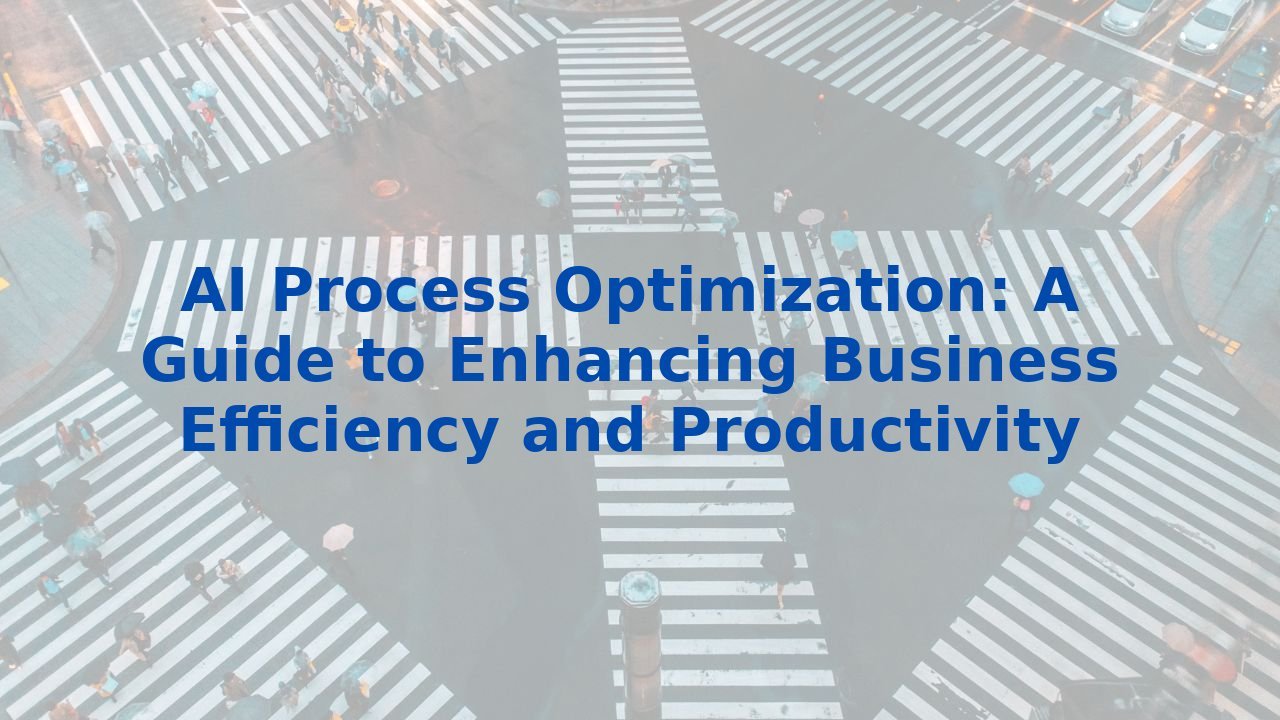AI Process Optimization: A Guide to Enhancing Business Efficiency and Productivity
AI Process Optimization: A Guide to Enhancing Business Efficiency and Productivity
Introduction
In an era where agility and speed define success, businesses are continually on the lookout for innovative solutions to boost efficiency and remain competitive. Enter Artificial Intelligence (AI) – a groundbreaking technology that not only automates routine tasks but also enhances decision-making and streamlines processes. This synergy ultimately manifests as increased productivity and operational excellence. Let’s explore how AI process optimization can transform your organization.
What is AI Process Optimization?
At its core, AI process optimization involves utilizing AI and machine learning technologies to refine business process management. This means analyzing vast amounts of data, automating repetitive tasks, and aligning organizational strategies to reach set goals. The ultimate aim? To minimize errors, boost productivity, and elevate overall operational efficiency.
Key Benefits of AI in Business Processes
Automating Routine Tasks
AI excels at managing high-volume, repetitive tasks such as data entry and document processing. By automating these mundane activities, businesses can liberate their workforce to focus on more strategic initiatives. For instance, through intelligent document processing, organizations can convert documents into actionable data without human intervention.
Improving Decision Making
In the fast-paced business landscape, informed decision-making is paramount. AI aids this by providing predictive insights based on data patterns. Imagine having the ability to forecast how pricing adjustments could influence profitability. This data-driven approach empowers analysts to make sound decisions rooted in evidence rather than guesswork.
Enhancing Customer Service
AI is reshaping customer interactions by analyzing feedback and surfacing insights. This empowers companies to fine-tune their offerings based on customer needs. Furthermore, AI-powered chatbots can efficiently handle basic inquiries, allowing human representatives to tackle more complex issues, thus enhancing the overall customer experience.
Optimizing Supply Chain Management
The complexities of supply chain management can be daunting; however, AI proves invaluable in analyzing purchasing data. By identifying anomalies in real-time, businesses can quickly react to shifts in demand, such as a surge in product requests. Imagine receiving instant alerts about supply shortages, allowing prompt action to mitigate potential losses.
Supporting Complex Decision-Making Processes
AI has the capability to extract insights from both structured and unstructured data, enabling decision-makers to make comprehensive assessments. By simulating alternative scenarios and weighing options against historical data, organizations can identify optimal courses of action, minimizing risk and maximizing potential gains.
Real-Time Process Monitoring
The ability to monitor processes in real-time is a game changer for businesses. AI-driven process mining provides a transparent view of process statuses, enabling immediate interventions when issues arise. This agility ensures that bottlenecks are resolved quickly, boosting overall efficiency.
Predictive Analytics and Risk Management
AI’s prowess in predictive analytics helps organizations foresee outcomes by scrutinizing historical data. Such insights allow businesses to preemptively tackle bottlenecks and react swiftly to market fluctuations. As AI uncovers potential risks and opportunities, it equips companies with proactive strategies to navigate challenges effectively.
The Role of AI in Business Process Management
AI transforms business process management by fostering continuous improvement. Here are key components that define this transformation:
Data Analysis
AI’s ability to analyze massive data sets empowers teams to identify trends, make data-driven decisions, and automate manual tasks. It acts as a compass, guiding businesses towards informed choices.
Process Building
AI not only can improve existing workflows but can also create entirely new ones. By leveraging previous data and user-defined parameters, it constructs the most efficient processes tailored to organizational needs.
Automation
Gone are the days of tiresome manual tasks. AI’s integration of Robotic Process Automation (RPA) dramatically reduces human labor for repetitive tasks, allowing teams to focus their energies on higher-value activities.
Training Employees for AI: The Key to Success
To unlock the full potential of AI, organizations must invest in upskilling their workforce. Here’s why employee training in AI is essential:
Enhanced Productivity
With proper training, employees can harness AI tools effectively, automating tasks and redirecting their time toward strategic initiatives that propel the business forward.
Improved Decision Making
Equipped with AI training, employees gain the skills necessary to analyze data adeptly, ensuring that decisions align flawlessly with organizational objectives.
Adaptability
In a world where AI technologies evolve rapidly, a trained workforce can seamlessly adapt to new systems, maintaining business agility in the face of change.
Reduced Errors
When employees understand AI and its capabilities, the likelihood of errors linked to manual processes diminishes significantly. This ensures higher accuracy and dependability in operations.
Conclusion
The transformative power of AI in business is undeniable. From automating routine tasks to significantly enhancing decision-making capabilities, AI serves as a catalyst for improved efficiency and productivity. As organizations embark on this technological journey, the importance of training employees to leverage AI tools cannot be overstated. Integrating AI into business processes, coupled with a commitment to ongoing employee development, positions organizations to thrive in today's dynamic landscape.
To delve deeper into the world of AI training and certifications, explore the various opportunities available that can equip your workforce with the skills needed to navigate this new era effectively.



